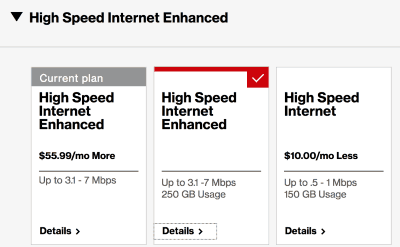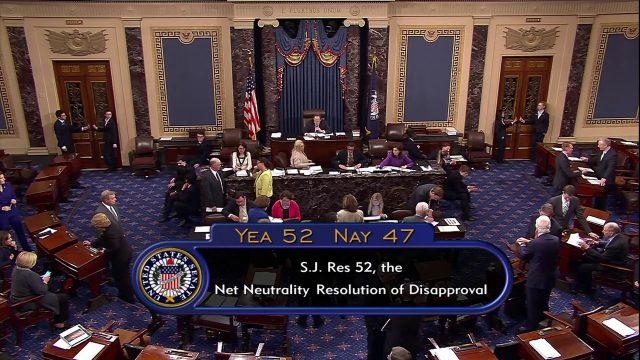
Existing Verizon DSL customers in some states are discovering the company is defining “usage” allowances on its two DSL packages. (Image courtesy: Smith6612)
Is Verizon slapping the caps on its DSL customers in the northeast?
A handful of New York and New Jersey Verizon customers were surprised to find Verizon suddenly defining usage limits on their DSL service on its website dashboard for existing customers:
- High Speed Internet: Up to .5 – 1 Mbps — 150 GB Usage
- High Speed Internet Enhanced: Up to 3.1 – 7 Mbps — 250 GB Usage
The sudden appearance of data allowances confused some customers, because the only references to them appear on pages for existing customers seeking to change or upgrade their current DSL package, and only in certain sections of upstate New York and New Jersey.
Careful scrutiny of Verizon’s terms and conditions make no reference to the new data caps, although the company declares customers are responsible for all usage charges. There is also no mention of the caps on Verizon’s sales pages for prospective customers, and phone reps didn’t know anything about them either.
Verizon has not indicated what might happen if a customer exceeds that cap or where the caps are being enforced, if anywhere.
We reached out to different Verizon press contacts twice this week to get confirmation and have heard nothing back.
If you are a Verizon DSL customer, do us a favor and let us know in the comment section what you see when you review options to change your DSL service.
Update 7:18pm EDT: Verizon did get back in touch with us after we went to press in response to several questions.
Here is our Q & A with Verizon’s Ray McConville, corporate media relations representative for New York, New Jersey, Connecticut, and FiOS:
Q. Is Verizon setting data allowances on their DSL service plans?
No. We have been conducting a usage billing trial to a very small set of customers in Virginia where we would measure their data use and display it in their billing. While these customers were given the 250 GB and 150 GB allowances you showed in those screen shots, we’ve never billed customers who exceed those allowances and have no plans to do so. The purpose of the trial was more the idea of accurately collecting and displaying usage in billing.
Q. If a customer exceeds that allowance, what happens?
Nothing. Again, we don’t do data caps. We have the small Virginia trial of displaying usage in billing, but it’s still not a cap, and customers aren’t billed for exceeding the 150 or 250 GB numbers.
Q. Is this a new policy?
No. It’s not a policy – we don’t have data caps or overage charges.
Q. In what states or service areas, if any, is this data allowance policy in effect?
Just the small Virginia trial, and customers are not charged for going over the “allowance.”
Q. If that is the case, why are customers in New York and New Jersey seeing the usage allowances?
It’s a likely system error; they should not have seen that. Only customers in the very limited part of Virginia where we have the trial should see such a thing.
Q. What is the status of the trial in Virginia?
Trial is ongoing – not aware of any end point.



 Subscribe
Subscribe Three years after Hillboro’s city council accepted the recommendation of a consultant that warned the city away from running its own residential fiber network, local officials have changed their mind and plan to extend the city’s institutional fiber network to homes and businesses, offering affordable $10 a month internet access, as well as gigabit speed for $50 a month.
Three years after Hillboro’s city council accepted the recommendation of a consultant that warned the city away from running its own residential fiber network, local officials have changed their mind and plan to extend the city’s institutional fiber network to homes and businesses, offering affordable $10 a month internet access, as well as gigabit speed for $50 a month. Despite the cost, more than 77% of respondents to a phone survey held at the time were interested in switching to the city’s municipal fiber network, if it was priced at least 10% less than the competition. Hillsboro’s fiber aspirations face significant cost challenges other communities don’t, because 80% of buildings in Hillsboro are served by buried cables, which cost much more to install over aerial cable strung between utility poles.
Despite the cost, more than 77% of respondents to a phone survey held at the time were interested in switching to the city’s municipal fiber network, if it was priced at least 10% less than the competition. Hillsboro’s fiber aspirations face significant cost challenges other communities don’t, because 80% of buildings in Hillsboro are served by buried cables, which cost much more to install over aerial cable strung between utility poles.
 Some Spectrum customers are getting nasty surprises in their latest cable bills.
Some Spectrum customers are getting nasty surprises in their latest cable bills. The Senate approved a resolution on a largely party line vote Wednesday that sends a symbolic message to the FCC it erred when it voted to repeal net neutrality.
The Senate approved a resolution on a largely party line vote Wednesday that sends a symbolic message to the FCC it erred when it voted to repeal net neutrality.